#Tamara Chambers
Explore tagged Tumblr posts
Photo

Tamara Chambers
Gender: Female
Sexuality: Pansexual
DOB: 7 February 1991
Ethnicity: English, German, Irish, Native American
Nationality: American
Occupation: Youtuber
#Tamara Chambers#lgbt#lgbt people#lgbtq#pansexuality#female#pansexual#1991#biracial#native#native american#german#irish#youtuber
83 notes
·
View notes
Text
Imagine being actors having resumes where the most important roles you've played were a sidekick on a disgraced YouTube movie review show & a misogynistic caricature of pop culture fans on the same show for 10 years. I would rather catch COVID on purpose lol
#also you sided with your boss on that same show when 30 people provided receipts of his abuse. how do you live like this#channel awesome#nostalgia critic#tamara chambers#malcolm ray
2 notes
·
View notes
Video
youtube
Earlier this year I partnered with Doug and the Channel Awesome crew to do a review for The Matrix 4. Doug was kind enough to pull in my new webtoon original series, NEXUS POINT, into the review in a fun way!
#Nostalgia Critic#Doug Walker#the matrix#matrix#review#movie review#Tamara Chambers#malcolm ray#Nexus Point#cyberpunk#scifi#science fiction#channel awesome
1 note
·
View note
Text
Book Recommendations
Kellen Graves
Prince of the Sorrows (Rowan Blood, #1) Lord of Silver Ashes (Rowan Blood, #2) Herald of the Witch’s Mark (Rowan Blood #3) The Fox and the Dryad
K.J. Charles
The Smuggler and the Warlord (A Charm of Magpies, #0.5) The Magpie Lord (A Charm of Magpies, #1) Interlude with Tattoos (A Charm of Magpies, #1.5) A Case of Possession (A Charm of Magpies, #2) A Case of Spirits (A Charm of Magpies, #2.5 Flight of Magpies (A Charm of Magpies, #3) Feast of Stephen (A Charm of Magpies, #3.5) Five For Heaven (A Charm of Magpies, #3.6) Jackdaw (A Charm of Magpies, #4) Rag and Bone (A Charm of Magpies, #5) A Queer Trade (A Charm of Magpies, #5.5) The Secret Casebook of Simon Feximal Butterflies (The Secret Casebook of Simon Feximal, #2) Remnant: A Caldwell & Feximal/Whyborne & Griffin Mystery (The Secret Casebook of Simon Feximal, #3; Whyborne & Griffin, #3.5) Proper English (England World, #1) Think of England (England World, #2) Song for a Viking (England World, #2.1) A Fashionable Indulgence (Society of Gentlemen, #1) A Seditious Affair (Society of Gentlemen, #2) A Gentleman’s Position (Society of Gentlemen, #3) Wanted, A Gentleman An Unseen Attraction (Sins of the Cities, #1) An Unnatural Vice (Sins of the Cities, #2) An Unsuitable Heir (Sins of the Cities, #3) Spectred Isle (Green Men, #1) The Henchmen of Zenda Unfit to Print Band Sinister The Rat-Catcher’s Daughter (Lilywhite Boys, #0.5) Any Old Diamonds (Lilywhite Boys, #1) Gilded Cage (Lilywhite Boys, #2) Masters in This Hall (Lilywhite Boys, #3) Slippery Creatures (The Will Darling Adventures, #1) The Sugared Game (The Will Darling Adventures, #2) Subtle Blood (The Will Darling Adventures, #3) The Gentle Art of Fortune Hunting The Secret Lives of Country Gentlemen (The Doomsday Books, #1) A Nobleman’s Guide to Seducing a Scoundrel (The Doomsday Books, #2) A Thief in the Night
A.J. Demas
One Night in Boukos Something Human Sword Dance (Sword Dance, #1) Saffron Alley (Sword Dance, #2) Strong Wine (Sword Dance, #3) Honey and Pepper (When in Pheme, #1)
C.S. Pacat
Captive Prince (Captive Prince, #1) Captive Prince: Volume Two (Captive Prince, #2) Kings Rising (Captive Prince, #3) Dark Rise (Dark Rise, #1) Dark Heir (Dark Rise, #2)
Joanna Chambers
Provoked (Enlightenment, #1) Beguiled (Enlightenment, #2) Enlightened (Enlightenment, #3) Unnatural (Enlightenment, #4) Restored (Enlightenment, #5) Gentleman Wolf (Capital Wolves Duet, #1) Master Wolf (Capital Wolves Duet, #2)
Tamara Allen
Downtime Whistling in the Dark The Only Gold If It Ain’t Love The Road to Silver Plume (Secret Service #1) Playing the Ace (Secret Service #2) Invitation to the Dance
Harper Fox
Brothers of the Wild North Sea Once Upon a Haunted Moor (Tyack & Frayne #1) Tinsel Fish (Tyack & Frayne #2) Don’t Let Go (Tyack & Frayne #3) Kitto (Tyack & Frayne #4) Guardians of the Haunted Moor (Tyack & Frayne #5) Third Solstice (Tyack & Frayne #6) Preacher, Prophet, Beast (Tyack & Frayne #7) Out
Sebastian Nothwell
Mr Warren’s Profession (Aubrey & Lindsey, #1) Throw His Heart Over (Aubrey & Lindsey, #2) Hold Fast Oak King Holly King
Lydia Gastrell
One Indulgence (Indulgence #1) One Glimpse (Indulgence, #2)
Hale Ginn
Lord of the White Hell, Book 1 (Lord of the White Hell, #1) Lord of the White Hell, Book 2 (Lord of the White Hell, #2)
Adella J. Harris
The Marquess of Gorsewall Manor (After the Swan’s Nest, #1) The Earl of Klesamor Hall (After the Swan’s Nest, #2)
Cat Sebastian
The Soldier’s Scoundrel (The Turners, #1) The Lawrence Browne Affair (The Turners, #2) The Ruin of a Rake (The Turners, #3) It Takes Two to Tumble (Seducing the Sedgwicks, #1) A Gentleman Never Keeps Score (Seducing the Sedgwicks, #2) Two Rogues Make a Right (Seducing the Sedgwicks, #3)
Lily Morton
The Mysterious and Amazing Blue Billings (Black and Blue #1) The Quiet House (Black and Blue #2) Something Wicked (Black and Blue #3) Merry Measure The Cuckoo's Call
Freya Marske
A Marvellous Light (The Last Binding #1) A Restless Truth (The Last Binding #2)
Other Authors
The Devil Lancer by Astrid Amara The Reluctant Berserker by Alex Beecroft The Scottish Boy by Alex de Campi Catalina Blues by Marlo York The Rake, the Rogue and the Roué by Eric Alan Westfall The Gladiator’s Master by Fae Sutherland The Song of Achilles by Madeline Miller When Skies Have Fallen by Debbie McGowan Nova Praetorian by N.R. Walker The Reanimator's Heart (The Reanimator Mysteries #1) by Kara Jorgensen One Night in Hartswood by Emma Denny
(last update 2024/06/14)
I would appreciate your recommendations if you enjoy one or more books from this list.
#book recommendations#links to goodreads books in the rowan blood blog#mm#cs pacat#c.s. pacat#kj charles#k.j. charles#harper fox#joanna chambers#astrid amara#alex beecroft#alex de campi#eric alan westfall#fae sutherland#madeline miller#goodreads#cat sebastian#hale ginn#lydia gastrell#aj demas#a.j. demas#tamara allen#sebastian nothwell#kellen graves#lily morton
23 notes
·
View notes
Text




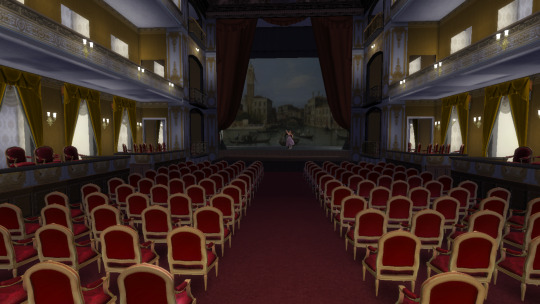

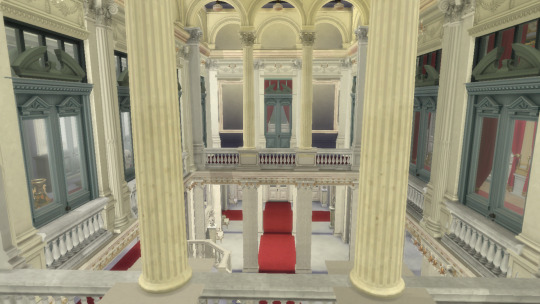
Colon Theatre
The Teatro Colón in Buenos Aires is one of the most important opera houses in the world. Its rich and prestigious history, as well as its exceptional acoustic and architectural conditions, place it on par with theaters such as La Scala in Milan, the Paris Opera, the Vienna State Opera, Covent Garden in London, and the Metropolitan Opera in New York.
In its first location, the Teatro Colón operated from 1857 to 1888 when it was closed for the construction of a new venue. The new theater was inaugurated on May 25, 1908, with a performance of Aida. Initially, the Colón hired foreign companies for its seasons, but starting in 1925, it had its own resident companies - Orchestra, Ballet, and Choir - as well as production workshops. This allowed the theater, by the 1930s, to organize its own seasons funded by the city's budget. Since then, the Teatro Colón has been defined as a seasonal theater or "stagione," capable of fully producing an entire production thanks to the professionalism of its specialized technical staff.
Throughout its history, no significant artist of the 20th century has failed to set foot on its stage. It is enough to mention singers such as Enrico Caruso, Claudia Muzio, Maria Callas, Régine Crespin, Birgit Nilsson, Plácido Domingo, Luciano Pavarotti, and dancers like Vaslav Nijinsky, Margot Fonteyn, Maia Plisetskaya, Rudolf Nureyev, and Mikhail Baryshnikov. Esteemed conductors such as Arturo Toscanini, Herbert von Karajan, Héctor Panizza, and Ferdinand Leitner, among many others, have also graced the theater. It is also common for composers, following the tradition initiated by Richard Strauss, Camille Saint-Saëns, Pietro Mascagni, and Ottorino Respighi, to come to the Teatro Colón to conduct or supervise the premieres of their own works.
Several top-notch maestros have worked consistently here, achieving high artistic goals. They include Erich Kleiber, Fritz Busch, stage directors like Margarita Wallmann or Ernst Poettgen, dance masters like Bronislava Nijinska or Tamara Grigorieva, and choral directors like Romano Gandolfi or Tullio Boni. Not to mention the numerous instrumental soloists, symphony orchestras, and chamber ensembles that have offered unforgettable performances on this stage throughout over a hundred years of sustained activity.
Finally, since 2010, the Teatro Colón has been showcased in a restored building, resplendent in all its original splendor, providing a distinguished setting for its presentations. For all these reasons, the Teatro Colón is a source of pride for Argentine culture and a center of reference for opera, dance, and classical music worldwide.
__________________________________________________________
You will need a 64x64 lot and the usual CC from TheJim, Felixandre, Harrie, Sverinka, SYB, Aggressivekittty, and other marvelous creators!
DOWNLOAD TRAY: https://www.patreon.com/user?u=75230453
(free to play 7/17)

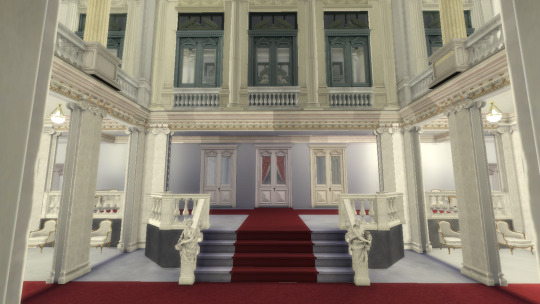
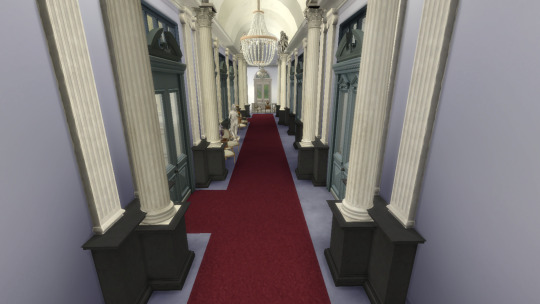
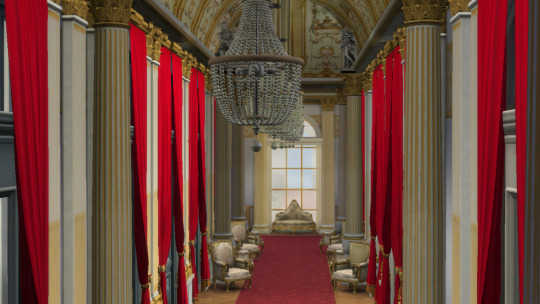


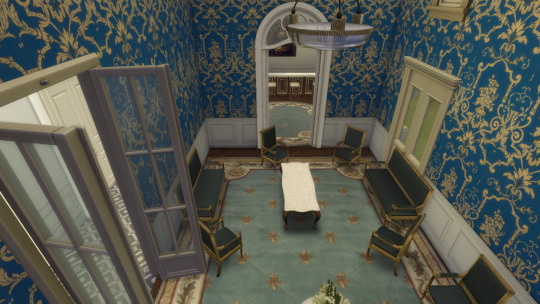
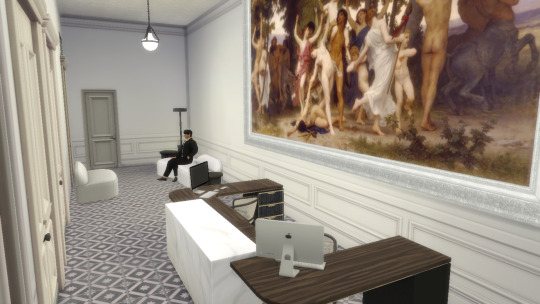




#sims 4 architecture#sims 4 build#sims4palace#sims 4 screenshots#sims4#sims4play#sims 4 historical#sims4building#sims 4 royalty#sims4frencharchitecture
73 notes
·
View notes
Text
theparallel submitted:
“Something Original” short (2016), with Doug Walker, Malcom Ray, and Tamara Chambers.
Really good fake trailer that 1) satirizes how almost nothing released in the past few years - and on the list of upcoming big budget 2024 films - is original, 2) has a ton of funny commentary on the film industry in general, 3) proposes the plot for an original film that actually looks pretty good.
It has been posted by itself, although it can also be found in the beginning of The Nostalgia Critic’s review of the “Wild Wild West” film
No romance, and sums up my feelings as well about the lack of originality in a lot of recently released films lately. Lack of originality & the combination of relying on a preexisting fanbase for ticket sales leads to making a ‘safe’ adaptation that doesn’t question anything. It’s 2024. Society needs to question, analyze, deconstruct, comment…it’s how we grow.
Additional Information: Trailer:
youtube
Added!
3 notes
·
View notes
Photo


Back at Willowshire Castle, the Royal Family anxiously watches as Queen Tamara's health rapidly declines. Her once radiant face now bears painful boils, and her pale, cold skin reflects her suffering.
King Wilhelm, Queen Margaery, and Princess Anne stand united by her side, their hearts heavy with concern. With eyes filled with sorrow and love, they offer unwavering support to their ailing matriarch. In this poignant moment, Tamara imparts her final words.
Summoning her fading strength, Tamara urges Wilhelm to remain resolute in the face of the ongoing war. She assures him that her spirit will forever be with him, even in her physical absence. These words provide solace to Wilhelm, Margaery, and Anne, strengthening their familial bond.
In the quiet chamber, a mixture of sorrow and determination fills the air. The Royal Family cherishes their time together, drawing inspiration from Tamara's memory. United and fortified by love, they prepare to face the challenges ahead, guided by their shared unity and unwavering affection.
5 notes
·
View notes
Text
ANDREA LEWIS, POOCH HALL, ROZ RYAN AND STAN SHAW STAR IN ‘A NASHVILLE LEGACY,’ A NEW ORIGINAL CELEBRATING THE UNSUNG WOMEN OF MUSIC HISTORY PREMIERING FEBRUARY 26, ON HALLMARK MOVIES & MYSTERIES
With Cameos from Curt Chambers and Ruben Studdard and featuring The Shindellas Performing an Original Song
Filmed on Location at the National Museum of African American Music
STUDIO CITY, CA – February 21, 2023 – Andrea Lewis (“Degrassi: The Next Generation”) Pooch Hall (“The Game”), Roz Ryan (“Hercules”) and Stan Shaw (“The Family Business”) star in “A Nashville Legacy,” a new, original Mahogany presentation premiering Sunday, February 26 (7 p.m. ET/PT), on Hallmark Movies & Mysteries. Featuring Tamara Chauniece, Kasi Jones and Stacy Johnson of world-renowned vocal group The Shindellas and cameos from musical artists Curt Chambers and Ruben Studdard. Filmed on location at the National Museum of African American Music in Nashville, Tennessee.
Naima (Lewis), who got her love of music from her late grandmother, moves to Nashville to intern at a prestigious museum, while pursuing a PhD in ethnomusicology. At the museum, she meets Damian (Hall), a volunteer and music producer and feels immediate chemistry, but is focused on her work and finding a subject for her dissertation. Luckily, as she is looking into the backstory of some donated items, a beautiful vintage dress leads Naima to uncovering a mystery surrounding a classic hit and the perfect dissertation focus. As Naima and Damian develop a friendship, he works with her to investigate the secret surrounding the dress but they soon find that the truth hits closer to home than either of them realized. The secret, which just might involve a prominent music producer, also threatens to make waves in the local community and in Naima and Damian’s budding romance. With her romance and new job at risk, Naima must deicide if she will keep the decades long secret or finally let the truth come to light.
“A Nashville Legacy” is from WulfPak Productions. Silvia Mathis is executive producer. David Wilf serves as producer. Roger M. Bobb directed from a script by Randall Jahnson, Maclain Nelson and Nina Weinman.
#a nashville legacy#hallmark movies & mysteries#press release#andrea lewis#pooch hall#mahogany films#hallmark movies
2 notes
·
View notes
Link
0 notes
Link
IMPERIAL BEACH, CA (August 18, 2024) – Tamara Chambers was killed in a hit-and-run crash in Imperial Beach Wednesday evening on August 14.
0 notes
Note
Fluffy gay romance in the vein of CS and KJC: Annick Trent (focused on 18th C. Corresponding Societies, I would say they're a bit less Romance focused than your comparative authors, but I thought they were fun to read), Marie Sexton's Trailer Trash (1980s, reminded me a bit of CS's Peter Cabot), Whyborne and Griffin series (romance with some eldritch horror based off the Lovecraft mythos (totally fine for non-horror fans IMO)), Sarah Granger had two I liked (Unforgiving Minute for modern tennis romance and A Minor Inconvenience for 1810s), Joanna Chambers Englightenment Trilogy (1820s Edinburgh), Aster Glenn Gray (I liked the first half of Honeytrap (Soviet/US) Sleeping Soldier was all right. I enjoyed some Tamara Allen.
Oooo I've never heard of these before so I'll definitely check them out, thank you so much!
0 notes
Text
Anna Goryachova was born in Leningrad (Saint-Petersburg). In 2008 she graduated with distinction from the Vocals Faculty of the Rimsky-Korsakov St Petersburg State Conservatory (class of Tamara Novichenko and subsequently class of Galina Kiseleva). From 2009 to 2011 she trained under Renata Scotto and Anna Vandi at the Accademia Nazionale di Santa Cecilia (Rome) and also under Romualdo Savastano at the A.R.T. Musica academy (Rome). From 2008 to 2011 Anna was a soloist at the Mikhailovsky Theatre and the St Petersburg Chamber Opera. In 2010 she was nominated for Russia’s Golden Mask National Theatre Award for her performance of the role of Donna Elvira in the opera Don Giovanni staged by Yuri Alexandrov. In 2011 under the direction of Alberto Zedda she made her debut at the Vlaamse Opera (Flemish Opera) in Antwerp as the Marchesa Melibea (Il viaggio a Reims, Mariame Clément’s production). From 2012 to 2017 Anna was a soloist at the Opernhaus Zürich, where she performed the roles of Adalgisa (Bob Wilson’s production of Norma), Rosina (Rossini’s Il barbiere di Siviglia), Polina (The Queen of Spades), Magdalena (Die Meistersinger von Nürnberg), Zerlina (Don Giovanni), Eustazio (Handel’s Rinaldo), Zelim (Vivaldi’s La verità in cimento), Masha (Eötvös’ Three Sisters), Marchesa Melibea and so many others. She has collaborated with such conductors as Teodor Currentzis, Nello Santi, Fabio Luisi, Alain Altinoglu, Enrique Mazzola, Riccardo Frizza, Ottavio Dantone, Stefano Montanari and Daniele Rustioni among others. Took part in the world premiere of Christian Jost’s opera Rote Laterne (2015). In 2012 Anna sang the role of Alcina (Orlando paladino) at the Théâtre du Châtelet in Paris and made her debut at the Rossini Festival in Pesaro (Italy) as Edoardo (Matilde di Shabran) staged by Mario Martone and conducted by Michele Mariotti. In 2020 at the Grand Théâtre de Genève she sang the roles of Angelina (La Cenerentola) and Sesto (La clemenza di Tito, staged by Milo Rau) in addition to making her debut at the Vienna State Opera in the role of Olga (Dmitri Tcherniakov’s production of Eugene Onegin); in Vienna she subsequently performed the roles of Angelina and Carmen. In 2022 as Angelina she made her debut at the Mariinsky Theatre (St.Petersburg). In the 2020–21 season Anna received Valencia’s “Best Mezzo-Soprano of the Season” award for the role of Angelina in La Cenerentola, staged by Laurent Pelly at the Palau de les Arts Reina Sofía. We all know that this has been a pretty tough time for the socio-political environment, which affected also the arts in a considerable way, and it was so beautiful to see you and your Ukrainian colleague hugging each other during the standing ovation. What do you think about this matter, about the way theaters, but also the society, took actions towards the Russian artists? Honestly, during these 3 months I have never found any change of attitude from my colleagues, nor from the theaters. The political conflict should not affect the cultural environment. Indeed, you all seemed such an united team on stage and behind it! Was it your first Carmen in the amazing production of Calixto Bieito, which such a passionate stage parter as Vittorio Grigòlo, for his debut at Don José? There was such an amazing energy coming from the stage towards us, in the audience! Thank you so much, I already sung in this production in Madrid in 2017. It’s a very intense staging. And I was very much touched to see the standing ovations in Wiener Staatsoper every evening. I never met Vittorio before and we really enjoyed playing and singing together. It was a perfect artistic match, I think! I adore Vittorio! He is not only an incredibly talented artist, but he is also a very nice person offstage. And his role debut was sensational! reposted from https://opera-charm.com/
0 notes
Video
youtube
Earlier this year, I reprised my role in a Nostalgia Critic review for the Matrix 4: Resurrections movie review. It was a lot of fun to be reunited with this group of friends again.
Malcolm filmed some behind the scenes for the episode, and you can see some of the antics we did while making this review. Check it out!
#nostalgia critic#matrix#matrix 4#ressurections#doug walker#Tamara Chambers#malcolm ray#channel awesome#movie review#making of#behind the scenes
0 notes
Text
Mark Twain & Pudd’nhead’s Satire: The One Drop Rule
Welcome back Everyone!! It’s me again with the deep thoughts. For this week of the blog, we are discussing Pudd’nhead Wilson. Not just the novel, but the underlying tones of issues within the book. Hopefully I won’t get side tracked this week with a philosophical “What does it all mean” posting again. Either way, thank you for reading!
Mark Twain published his book Pudd’nhead Wilson in 1893. Twain had already written other works and had them published before then. He also had already earned his title of a worker of satire by this point. Pudd’nhead WIlson follows three plot lines within the same town: A northerner named David moved to a Missouri town to be a lawyer who gets shunned from the small town and nicknamed Pudd’nhead, A slave woman named Roxy makes a hard decision in the beginning of the story to save her child by switching him with the master’s newborn who looks equal skin tone as her master’s child and born around the same time, and by the end of the novel- An untimely murder mystery that blames innocent men. Twain laces satire throughout the story to master his invested meanings.
There are two things to remember when reading Pudd’nhead WIlson. The first thing is to remember that this is a society that focused on ‘The One Drop Rule’. Outlandish ideas and uneducated Psuedoscience held people of this time in a choke hold about the concept that if a white person even had ‘one drop’ of African American blood in them, that they were considered themselves as a black person (which in this time ties them to a life of enslavement and oppression). While the readers are to sympathize with Roxy as a mother, she makes an unbelievable choice in the name of protecting her child. She switches her child for the master’s child who is just a couple days different in age and have the same skin complexion. The fact that both children are the same color of skin complected with different family lineage shows just how diverse genetics can be. The master’s child was born from two white people while Roxy gives birth to a child 1/16 of Black Ancestry. (A modern day example is looking at pictures of Tamara Mowery’s son who is ‘a quarter of Black Ancestry’ has the same amount as White Passing Actress Troian Bellisario). Genetics work in multiple different complex ways, and children can look the same or different from the counterparts. It were the adults of this time that bothered doing the work to investigate the lineage of each person to strike them out as they do others with Black Ancestry.
Another thing to take into consideration is the conversation of Nature vs. Nurture. This topic feels like it holds reservation in every conversation these days. However, the way that Twain describes the lives that the switched individuals puts a spotlight on the subject as he dissects it for satire. The Nature vs. Nurture concept was coined in the Enlightenment Period by Francis Galton. The subject covers the debate or whether it is either your physical environment (Nurture) or your genetic ancestry (Nature) that describes who you become.
Twain opens this conversation of Nature vs. Nurture with satire with talking about how the swapped children grow out. Roxy’s child (now named Tom) grew up to be a criminal and a murderer after being saved from the life of a black, enslaved person. The master’s child (now named Chambers) was raised as a slave with torture and oppression just to grow up to be a civilized man. Once the truth was exposed, Chambers was recognized as an heir to his estate and legally in charge of the entire plantation.
Mark Twain places Satire in each aspect of this novel showing the immoral practices ‘Blood Searching’, Racial Speculation, and the Enslavement of Black People. While Twain gives his audience and readers something to sit and think of, they enjoy the laughs that come with solving a murder by accident.
I do not feel like this kind of approach would work in modern day society. How we could find plenty of stories with symbolism and skewed meanings that underly bigger issues. Showing someone with 1/16 of Black Ancestry as “naturally violent and a town hassle” would only add to the list of many harmful stereotypes that white people have created against the black community.
0 notes
Text
Reggie’s Report Card: Lohengrin, Metropolitan Opera, March 2, 2023
Yannick Nézet-Séguin, Conductor: 4.2/5 Stars
I expected good things from Yannick going into last night, given what I’ve heard of him in symphonic music, and he largely met and satisfied the requirements of his role. His tempi were well judged, responsive to the action of the text and the inner life which the orchestra reflects, and many of the most musically and dramatically satisfying moments in the piece came at his baton. The horns, in particular, sounded wonderful—resplendent and full, never harsh or braying, and unified both as a section and with the ensemble at large. Winds were at times less satisfying, sometimes failing to spin the long lines of Elsa’s theme with sufficient legato, but the clarinets, in particular, deserve praise for their contribution to the drama’s color. As a string player, it is my duty to complain about something or another those sections could be doing, and so shall I here. The violins took more time to warm up than I’d have liked—their task in supplying that silvery, ethereal timbre the prelude asks for was only met towards the section’s end, and before then was watery and weak, rather than transparent, but full. Once at full strength, however, they were often a source of great beauty, giving the proud lines of the piece’s martial music a soaring arc, the intimacy of the Bridal Chamber Scene an honesty of sentiment, and the scheming of Ortrud and Telramund powerful dramatic tension through their exemplary articulation and rhythmic vigor. At times, however, I do wish they’d lean a bit into “messiness”; there’s a tendency, due to the section’s level of technical polish, to treat clean, faultless unity of sound as the norm, rather than as an expressive decision—a bit of fray in the upper reaches of the violins would give the public scenes a more lived-in, natural exuberance. The celli, of course, deserve recognition for their contributions to the night’s orchestral success, but I’d have liked to have felt the colors of the violas and basses more potently. They, of course, would never project over the rest of the sections, but the depth and warmth they provide to the middle and lower voicings in the strings was at times lacking. The same could be said for the lower voices of the chorus: they were at something like 140 strength, with a roughly 2:1 men to women ratio, but in voice the men’s chorus favored the tenorial voice too strongly. There is a certain machismo in Wagner’s writing of the men-at-arms, and with what’s written for them, he imparts a definite archetype of martial masculinity—the baritones and basses were needed to give that example firm grounding and, of course, a “manly” sound (bleh, I know). Overall, however, the orchestra came away as the most successful performers of the night, and Yannick, as I’m not wont to say often, fulfilled the demands of his position admirably.
Tamara Wilson, Elsa: 3/5 Stars
Elsa is my favorite character in this opera—seriously. I love Ortrud for her shadiness and general girlbossery, but Elsa, for many interpreters, is an enigma. Many sopranos find her bland, but a few see past the character’s initial coolness to see the incredibly rich inner life the girl harbors within her. Tamara Wilson came most into her own in the Bridal Chamber Scene, like her Lohengrin, but was generally of more secure voice. Like Christine Goerke, Wilson is the possessor of a significant instrument. For that reason, it’s a pity that the typical American nasality mars the warmth of her tone, robbing it of the variety of colors necessary to imbue Elsa with real life. I personally see the character as like a medieval mystic—particularly in the centrality of bodily experience and imagery of bridal union with Christ. When Elsa falls dead at the opera’s end, it is not for having lost a husband, but for having lost her only opportunity to be transfigured; union with Lohengrin is her opportunity to transcend the empty, lonely existence through which she wanders, lost in dreams of salvation. Elsa sings to Lohengrin that in him she must fade away, giving all that she is—this is a woman giving herself to union with her god, not just to a man. In Lohengrin, she senses the divine, but, tragically, the doubt Ortrud plants in her mind disturbs the absoluteness of her faith. Elsa, sensing her opportunity for salvation, wants it to be bared to her outright—she wants to know Lohengrin’s name, as he said she may not, so that she may speak it as sweetly as he does hers—to know him as he knows her. In this she fails the test of her faith—Ortrud and Telramund fail because they rely on their own craft, wit, and strength to achieve their goals, and Elsa falls in line with them when the trauma of her absolute solitude drives her to desperation. Even having just married her knight, she awaits his leaving with terror, beset by all the fear and uncertainty her faith had veiled and fortified her against. Lohengrin fails to comfort her as a woman, rather than as a wife, and, being denied human comfort, Elsa falls to her fears, demanding his name and, in doing so, failing the test of her faith. At the scene’s end, having realized the enormity of her loss, she echoes Peter at his denials of Jesus—when she cries “Allewiger, erbarm dich mein!” she has already passed on, the one purpose for which she lived having passed her by. As Elsa, Wilson imparted her humanity best—the limitations of her range of tonal colors stopped her from portraying the dreamy, otherworldly character Elsa has in the first act. Her legato, given her experience as a Verdian, did not satisfy, either, and so her separation from the declamation of the King and his men was not as clear as it should have been. At times, her vibrato also widened more than I’d have liked. As Elsa’s doubt reinvigorates her humanity, Wilson singing began to satisfy more, and when Elsa’s shame and grief follows her error, Wilson’s effort to imbue her lines with sentiment brought her voice into more natural alignment, forgoing the persistent nasality endemic to her vocalism for fleeting moments. Generally, Wilson’s inability to impart Elsa’s transformation through her music hampered the otherwise audible efforts to do the drama justice: the light embellishments in Elsa’s dreamy fantasy lacked spontaneity, the legato smoothness, and a general lack of rhythmic flexibility denied her portrayal the range of expression required to do the character’s inner transformation justice.
Piotr Beczała, Lohengrin: 3/5 Stars
Oh, Piotr. This singer frustrates me because, aside from seeming like a nice guy, he has a gorgeous instrument and some idea how implement it musically and dramatically, but the technique with which he wields it fails him. It generally seems that youth carried his voice intact into his forties, but now that he’s in his fifties, the insecurity in his top, with the way he’s so often scooped up to higher tones, has come to claim him. What’s more, his mastery of his breath is incomplete, so a wobble mars his middle voice and above, and sustaining the long lines asked of him in this role with heroic voice proved a struggle. Piotr was at his best between the extremes of his character: Lohengrin combines dramatic proclamations bursting above the upper passagio with scenes of great intimacy, sensitivity, and art, requiring an able mezza voce to impart fully. The tenor’s declamation lacked thrust, insufficiently rhythmically rigorous to give Lohengrin’s expression a flexible, potent authority, and his mezza voce suffered from problems of registration—Piotr’s head voice is not sufficiently integrated to deliver “Das süsse Lied verhallt”. That very scene perhaps encapsulated all aspects of this tenor’s incomplete portrayal. His opening remarks to Elsa were imparted warmly, but without the sensual mystery which intrigues and hints at the man beneath the mask of anonymity. This scene is remarkable for how greatly it develops Lohengrin’s character in so little time. The scene is effectively a confrontation, the fruit of the seeds of doubt Ortrud planted in Elsa’s mind blooming and forcing Lohengrin to both soothe and please his bride as her anxieties seize her. Though a warrior, Lohengrin appreciates the sensual beauty of nature and speaks of love as his true calling. Piotr failed to rise to the poetry of the character, his insecurity in his high notes marring the character’s flights into pure sentiment. He was most at home in Lohengrin’s attempts to calm Elsa, but truly found his footing in Lohengrin’s frustration with his failure and resignation to the demands of his duty; there, Piotr’s warm, rich tone in his middle voice took a plaintive tone, darker and softer as his character came to terms with the ruination of his joy. The extremities of expression written into this scene stretched Piotr more or less to the limits of his ability, but also showed glimmers of beauty here and there. Lohengrin’s procession of aria’s in the opera’s end strained him similarly, but did not show him to any great advantage, though “In fernem Land” was home to the few moments in which his mezza voce took a more promising timbre. All in all, Piotr was a sympathetic presence let down by his technical insecurities.
Christine Goerke, Ortrud: 2.8/5 Stars
In an interview played back during one of the intervals, Goerke describes her approach to Ortrud as believing in earnest that she is the wronged party—denied her birthright, as the princess of a conquered people, and denied the dignity of practicing her culture, such as her religious beliefs, openly. It’s a smart approach, as, with most well-written antagonists, there is an element of truth to their claims. In these things, I respect Goerke’s acumen, and in her portrayal there was certainly an impression of dramatic instinct and attention to the text. Vocally, however, her technique did not allow her the freedom to express her ideas fully. Her instrument is undeniably the real deal: full and rich in the middle, but short on top as many dramatic sopranos find themselves. Sure enough, Goerke seemed most at home, vocally, in the middle of her voice, which she could emit with dramatic thrust, and her top had the wiry, metallic tinge I expect of her. She’s stated her admiration for Astrid Varnay in the past, and it shows in her voice. Unfortunately, Varnay’s technique was the weakest part of her artistry, and like Varnay, Goerke commands a very generous vocal endowment without either full control or freedom. The lower passagio was rather veiled, sour even, brightened by the standard American nasality, but lacked the power of her chest voice, which came full of color and bite when she opened into it. Her voice, really, is in parts: the colorful, punchy chesct voice, the veiled, unpleasant lower-middle, the wide, warm middle range, then the thinner, strained acuti. Goerke, however, is of will in proportion to her vocal endowment, and gave great effort to meet the extreme demands of Ortrud’s music, but this effort took focus from her dramatic portrayal, which was, as Goerke said, of a woman seeking justified vengeance, but her Ortrud lacked the bite, the sarcasm, bitterness, and malicious craftiness others have brought to the role. By the end, Goerke seemed more intent on making it through “Fahr heim!” than in crowning a complete, persuasive interpretation.
Thomas Hall, Telramund: 3.9/5 Stars
Thomas Hall, I believe, made his Met debut last night, and as a replacement for Evgeny Nikitin—a known element at the Met who, I’m glad to say, was not missed last night. Unlike Nikitin, Hall actually saw fit to sing all of his music, and with as thankless a role as Telramund, he actually acquitted himself well. His instrument is appropriate for the role, if not glamorous: well enough suited to the low tessitura that he was able to resonate well in the lower notes, but secure enough up top to make something of the dramatic outbursts written for his character. His characterization was similarly adequate. Hall’s Telramund remained a noble throughout his trials, portraying a man led astray by his thirst for power. His Telramund, however, is always earnest—he does not represent his beliefs falsely, truly believing, at first, Elsa guilty of murder, Lohengrin of witchcraft, and himself justified in attempting the latter’s life. Hall did an admirable job in filling a role which is often poorly cast with a thoughtful, capable presence. His voice might have not been the most beautiful or unique in timbre, but he fulfilled the assignment, which, on short notice, is all that can be asked for, particularly in this role.
Günther Groissböck, King Heinrich: 2/5 Stars
I distinctly remember Groissböck’s performance as Filippo II in Don Carlo last Fall on account of his vocal estate—namely, that it was far lesser than I’d ever heard it, dry, strained, and emitted without a shadow of the ease with which I’d previously heard him sing. Lamentably, on account of what I know of his dramatic talents, his voice was in a similar state last night. As Heinrich, Groissböck generally failed to imbue his character with the dignity and authority asked of him. Heinrich can easily become a tedious presence—he’s often the voice of Wagner’s politics, notably of ethnic and national identity, as well as gender, in the opera, and as such is easy to portray as a rambling, moralizing bore. While Groissböck did not fall into that trap, he nonetheless failed to produce an offering of any other kind of interest, often limited to just playing it straight by the lack of color and vigor in his voice. Often, what was of most interest in listening to him was knowing a high note’s approach and wondering if he’d make it—he largely did, though he flagged in pitch on some, fell into straight, white tone on others, and generally failed to impart the role with the quiet, simple dignity which would make Heinrich not only a driver if the night’s action, but a sympathetic one with presence and gravitas.
Also, just as a note, I found it funny that the Met omitted Lohengrin’s line “Nach Deutschland sollen noch in fernsten Tagen des Ostens Horden siegreich nimmer ziehn!”
1 note
·
View note
Text
Yesterday, in an interview with Latvian Radio, I talked about how Russians treat animals. About the fact that they torture animals. About breeding farms in Kharkiv and Kherson regions, where they cut pieces of meat from live animals, and the villagers then found and killed these unfortunate, tortured creatures. At this episode, the translator burst into tears. I don't, not because I don't feel sorry, but there is simply a sense of focus and scrupulousness with which we must speak about these crimes. And in the evening we all read about torture chambers for children. We are dealing with primitive, pure, absolute evil. With a country where the margin of error is not the percentage of sadists, but the percentage of normal people. Just as in ordinary societies the presence of one maniac in a million does not make the whole nation maniacs, so in Russia the presence of one normal person in a million does not make the whole nation healthy.
Tamara Gorikha Zernya
Вчора у інтерв'ю Латвійському радіо я розповідала про те, як росіяни поводяться з тваринами. Про те, що вони катують звірят.Про селекційні ферми на Харківщині і Херсонщині, де вони вирізали шматки м'яса із живих тварин, а селяни потім знаходили і добивали цих нещасних, замучених створінь. На цьому епізоді перекладачка розплакалася. Я ні, не тому що мені не шкода, а просто є відчуття зосередженості і скрупульозності, з яким ми повинні говорити про ці злочини. А увечері ми всі прочитали про катівні для дітей. Ми маємо справу з примітивним, чистим, абсолютним злом. З країною, в якій на межі похибки не відсоток садистів, а відсоток нормальних людей. Як у звича��них суспільствах присутність одного маніяка на мільйон не робить усю націю маніяками, так і на росії присутність однієї нормальної на мільйон не робить здоровими увесь народ.
Тамара Горіха Зерня
#russiamustdie
1 note
·
View note